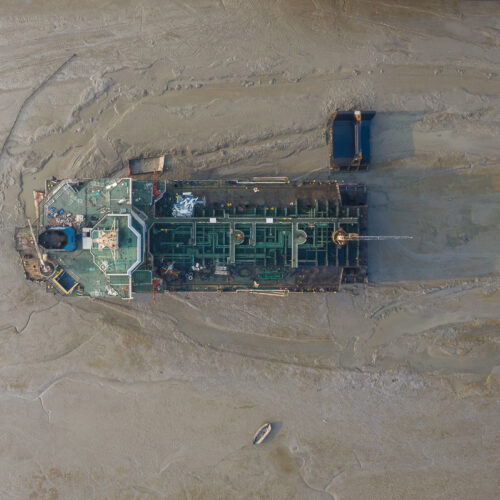Press Release – Brazil must allow its own toxic aircraft carrier to dock
NGOs demand urgent action of Lula administration as ship needs repair and safe harbour
Three months after its return to Brazil following Turkey’s rejection to scrap it, the toxic aircraft carrier SÃO PAULO continues to be towed in circles off the coast of Pernambuco state, Brazil. The Brazilian Environment Agency (IBAMA) and Brazilian Navy have so far failed to provide the vessel with a safe mooring place despite a Salvage Master inspector having declared the ship is taking on water and needs repair. Left to drift twelve to sixteen nautical miles from land, burning fuel and resources, the new owners, MSK Maritime Services & Trading LTD, gave the Brazilian government a twelve-hour warning to allow the ship into port or they would immediately abandon it. Though this threat was met with a court injunction prohibiting such an action, NGOs say that the Brazilian government is to blame, and now must move with extreme urgency to resolve this matter.
In a letter to the new Minister of the Environment and Climate Change and the director of IBAMA, the coalition of international and national NGOs that has repeatedly raised the alarm is therefore now urging the new Brazilian administration to immediately allow the ship to dock at a Brazilian Naval facility so that it can undergo repairs and subsequently be carefully surveyed for all of the hazardous materials on board.

In their letter, the coalition laid out the requirements for proper and safe recycling of the vessel, which upon the decision to scrap it becamehazardous waste under the Basel Convention. The groups reiterated the need for a full, independent, and transparent inventory of the hazardous materials (IHM) found onboard the ship, especially the asbestos, heavy metal-laden paints, PCBs, and the possible presence of radioactive isotopes. They also stated that the ship should not return to Aliaga, Turkey, where it was originally destined, following oposition by local communities and authorities due to the large amounts of hazardous materials onboard and concerns that these will not be managed in a safe manner, putting workers’and community health at risk. The NGOs also warned the government that the ship should not be scuttled or sunk to become an “artificial reef” or any other form of deliberate sinking, which the Brazilian Navy shockingly discussed as a possibility in a December 29 inter-agency meeting.

For more information:
Jim Puckett, Basel Action Network, e-mail: jpuckett@ban.org, Phone: +1 206-354-0391
NGO Shipbreaking Platform, e-mail: nicola@shipbreakingplatform.org, Phone: +32 (0)260.94.419
Related news

Platform News – Platform’s member organisation LIFE wins 2021 Right Livelihood Award
Legal Initiative for Forest and Environment (LIFE) has been awarded the Alternative Nobel Prize
... Read More
Press Release – Clemenceau’s sister ship heading for the scrapyard
The São Paulo, as the Clemenceau, contains large amounts of hazardous substances within its structure.
... Read More
Platform News – Maersk incited business partner to opt for worst breaking practices for 14 ships
A third report by the investigative journalists of Danwatch, “Maersk and the shadowy deals”, reveals that the Danish container ship giant has incentivised the sale of 14… Read More

Platform News – Worker killed when breaking the Hanjin Rome
Two workers lost their lives at the Chittagong shipbreaking yards in the last two weeks, bringing the total death toll this year to six workers. … Read More

Press Release – Turkey demands new survey of massive toxic warship before import
Turkish authority Eyyüp KARAHAN, General Director of Environmental Management, wrote to Brazilian IBAMA, requiring a new IHM to be conducted prior the export.
... Read More
Press Release – Platform publishes list of ships dismantled worldwide in 2022
In 2022, 292 large tankers, bulkers, floating platforms, cargo- and passenger ships ended up for dirty and dangerous breaking on tidal beaches in Bangladesh, India and Pakistan.
... Read More
Press Release – Province shuts down hazardous shipbreaking at Union Bay
The NGO Shipbreaking Platform celebrates British Columbia’s decision to cancel the Crown land lease held by Deep Water Recovery Ltd. (DWR) in Union Bay, effectively halting… Read More

Platform News – Legambiente joins Platform’s campaign for sustainable ship recycling
The NGO Shipbreaking Platform welcomes onboard Legambiente, its first-ever Italian member organization. Legambiente is a non-profit association created in 1980 for the safeguard of the environment… Read More
